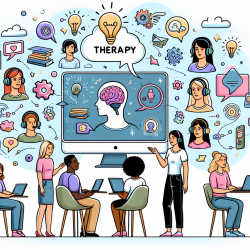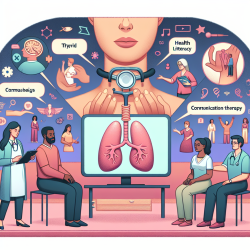In an era where technology seamlessly integrates into our daily lives, the field of education continues to explore innovative approaches to support student success. As school counselors, our mission extends beyond academic advising to ensuring the holistic well-being of our students. The emergence of online therapy as a viable modality presents a curious exploration into enhancing student support services, particularly in addressing speech therapy staffing challenges and broadening access to mental health resources.
The landscape of school-based support services has traditionally been characterized by in-person interactions. However, the advent of online therapy platforms, such as TinyEYE, has begun to transform the paradigm, offering intriguing possibilities for students, educators, and counselors alike. This shift towards digital solutions is not merely a response to contemporary challenges but a forward-looking approach to creating more inclusive and accessible educational environments.
Understanding the Scope of Online Therapy
Online therapy, also known as teletherapy, encompasses a range of services delivered via the internet, including speech therapy, occupational therapy, and mental health counseling. This mode of delivery leverages video conferencing technology to connect therapists with students in real-time, breaking down geographical barriers and making specialized support more accessible to schools facing speech therapy staffing shortages or those located in remote areas.
The Role of School Counselors in Integrating Online Therapy
As school counselors, our role in integrating online therapy into our schools' support services framework is multifaceted. We serve as advocates, facilitators, and liaisons, working collaboratively with students, parents, educators, and online therapy providers to ensure a seamless and effective implementation. Our efforts are guided by a commitment to:
- Assessing Needs: Identifying students who can benefit from online therapy, taking into account factors such as availability of local services, individual learning needs, and preferences for digital versus in-person support.
- Facilitating Access: Collaborating with online therapy providers to establish the technological infrastructure and logistical arrangements necessary for students to participate in therapy sessions.
- Monitoring Progress: Working closely with online therapists and educators to track students' progress, address any challenges that arise, and adjust support plans as needed.
- Advocating for Inclusion: Ensuring that online therapy services are integrated in a manner that respects and accommodates the diverse needs of all students, promoting an inclusive school culture.
Benefits of Online Therapy in Schools
The integration of online therapy into school support services offers numerous benefits, including:
- Increased Accessibility: Online therapy enables students in underserved areas or those with mobility challenges to access specialized support services.
- Flexibility: The digital nature of online therapy allows for greater scheduling flexibility, accommodating the varied routines of students and their families.
- Reduced Stigma: Receiving therapy in a familiar, private setting can help reduce the stigma associated with seeking mental health support, encouraging more students to take advantage of these services.
- Enhanced Collaboration: Online platforms facilitate easier communication and collaboration between therapists, educators, and parents, fostering a more holistic approach to student support.
Challenges and Considerations
While online therapy presents a promising avenue for expanding student support services, there are challenges and considerations that must be addressed to ensure its effectiveness:
- Ensuring Equity: Access to reliable internet and technology is a prerequisite for online therapy, highlighting the need for schools to support students who may lack these resources.
- Maintaining Confidentiality: Protecting students' privacy and confidentiality is paramount, necessitating stringent data security measures and adherence to ethical standards.
- Building Rapport: The virtual nature of online therapy requires additional effort from therapists and students to establish and maintain a strong therapeutic relationship.
- Regulatory Compliance: School counselors must navigate the complex landscape of licensure and regulation governing online therapy services to ensure compliance with state and federal laws.
Inspiring a Future of Inclusive Support
The exploration of online therapy in schools is more than a mere adaptation to technological trends; it represents a deliberate effort to reimagine how we provide support to our students. By embracing this modality, we open new avenues for addressing longstanding challenges such as speech therapy staffing shortages and limited access to mental health services. As school counselors, our curiosity and willingness to innovate can inspire a future where every student has the opportunity to thrive, both academically and personally.
As we continue to navigate this journey, let us remain committed to the principles of equity, inclusivity, and collaboration. Together, we can harness the potential of online therapy to create a more supportive and empowering educational landscape for all students.










